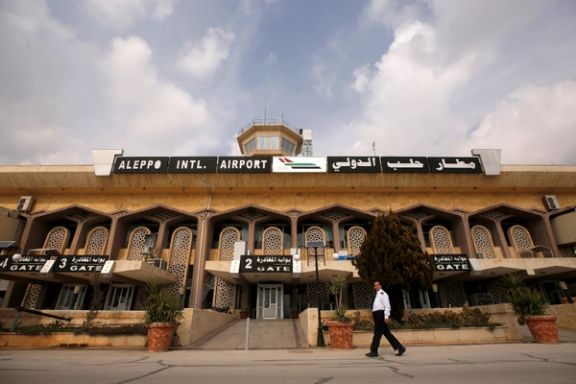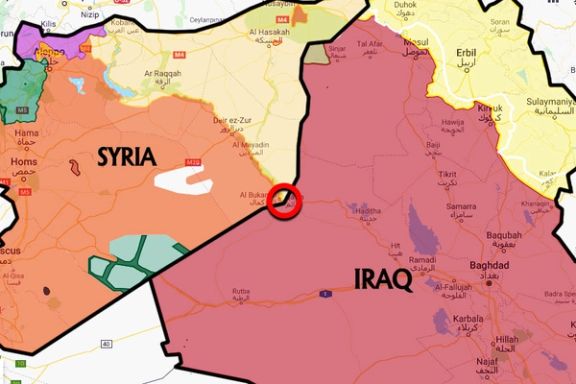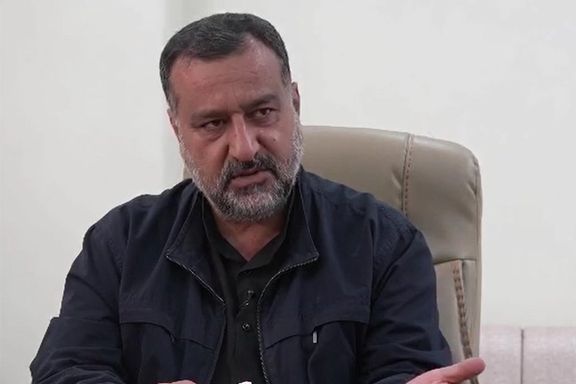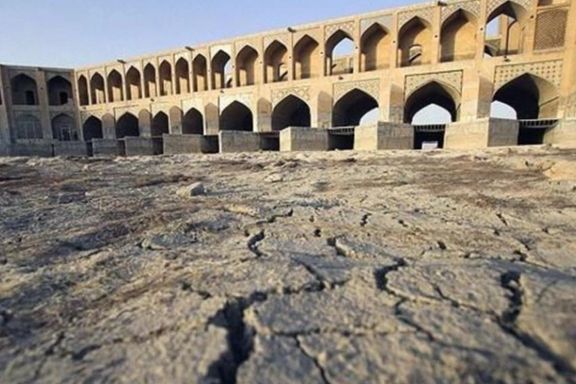Syria Says Fresh Israeli Air Strikes Hit Iranian Targets In North

Israel targeted Syria's Aleppo with an air strike on Saturday, which caused some material damage there, the Syrian defense ministry said in a statement.

Israel targeted Syria's Aleppo with an air strike on Saturday, which caused some material damage there, the Syrian defense ministry said in a statement.
The Syrian Observatory for Human Rights (SOHR) reported that Al-Nairab Military Airport near Aleppo and targets in its vicinity were also attacked.
SOHR stated that there are warehouses and centers belonging to Iranian militias in the areas hit by missiles launched from warplanes.
The airports themselves did not sustain damage, SOHR said.
Six explosions were heard in the Nairab airport area, while one missile landed in the area of Aleppo International Airport.
Reuters reported that the Israeli military declined to comment. While Israel has launched hundreds of air strikes against Iran-affiliated forces in Syria in the past decade, it usually refuses to confirm or deny its involvement.
Most of these attacks have targeted weapons depots belonging to the Iranian military network in Syria, and arms transfers destined for Iran-backed forces, particularly the Lebanese Hezbollah. Israel has vowed not to allow more entrenchment by Iranian forces in Syria.
The latest strikes seem to be related to heightened tensions in the region amid the Israeli military operation against Hamas.
On December 25, a suspected Israeli air strike killed the top Iranian IRGC general, Razi Mousavi, at his residence near Damascus. Iran has vowed revenge for the targeted killing, similar to a US air strike that killed Iran’s Quds Force commander Qasem Soleimani in January 2020 in Baghdad.

Iraqi officials have confirmed earlier reports that unidentified warplanes attacked Iran-aligned militia targets in Syria, near the Iraqi border early Friday.
The attack resulted in four confirmed casualties, as stated by a local commander from Iraq's Popular Mobilization Forces (PMF). A Syrian war monitor reported that as many as 19 were killed, including four members of the Lebanese Hezbollah.
Iran International reported on the attack on Friday, but there was no official confirmation at the time.
While the commander denied harm to groups' fighters near the Syrian border, the strikes specifically targeted an eight-truck convoy, leading to the destruction of at least four trucks and three buildings affiliated with an Iranian-backed militia group, according to sources with connections to Syrian border officials.
Iran-aligned forces, including Hezbollah, hold influence across significant areas in eastern, southern, and northwestern Syria, as well as in suburbs surrounding the capital. Suspicions point toward Israel, known for its historical targeting of Iran-linked sites, although the US denies any involvement, emphasizing the absence of defensive strikes overnight.
Despite its reluctance to directly get involved in the Gaza war, Iran persists in utilizing proxy forces across Syria, Lebanon, and Yemen to target both US and international interests, with a record of over 100 drone and rocket attacks. Criticism is mounting against President Joe Biden for perceived leniency toward Iran, prompting calls for a more robust approach from former US officials and Republican lawmakers.
Iran denies any role in the attacks by militants, asserting that planning and execution are independently carried out by its affiliated armed groups. Despite escalating rhetoric, Iran, facing economic challenges, exercises caution to avoid significant losses.

Iranian media and politicians continued to criticize the government for its close ties with Russia, while it supports UAE claims on three islands in the Persian Gulf.
Moscow has repeatedly sided with the United Arab Emirates during summits with Arab states regarding claims on Abu Mousa and Greater and Lesser Tunb islands, that have been Iran’s sovereignty since 1971.
The conservative Jomhouri Eslami [Islamic Republic] newspaper, which is always critical of President Ebrahim Raisi's policies, in its Wednesday's issue asked the government why has it “turned the Kremlin into its Mecca.”
The daily asked the government: "If you are not going to expel Russia's ambassador and downgrade your relations with Moscow, at least explain why you turn to the Kremlin rather than to Mecca."
The newspaper was referring to the Muslim practice of facing Mecca when they want to talk to God in their daily prayers.
The daily went on the say, “The fact that the Foreign Ministry had to remind the Russian government twice that it has undermined Iran's territorial integrity showed that Tehran is not going to opt for a serious confrontation with Moscow." The conservative newspaper added that "summoning Russia's charge' d' affairs by the Foreign Ministry was less than serious." The daily added: "When they do it twice, they want to tell you that it was not a mistake." The newspaper then called for a treatment that would make Russia regret its stance.
Supreme Leader Ali Khamenei and President Ebrahim Raisi who have been seriously humiliated by Russia's stance, are also under attack from Iranian social media users. One user wrote that in case the issue of ownership of the three islands is raised at the UN Security Council, Russia and China have already revealed their stance in favor of the United Arab Emirates. Ironically, in such a situation, only a veto by the United States, which Iran perceives as its arch enemy, can save Tehran from serious trouble and damning humiliation.
Meanwhile, former Foreign Minister Ali Akbar Salehi said in an interview with Entekhab news website in Tehran that it would be catastrophic for Iran to tie its destiny entirely to its ties with Russia, China and even the United States. "Iran should stand in the middle of those three countries and benefit from opportunities and their weaknesses."
In another development, in an attempt to make sense of Russia's position, Iranian foreign policy analyst Mehdi Motaharnia said that "By getting closer to the United Arab Emirates, Russia is telling the West that Iran is no longer its strategic ally. Nonetheless, Moscow uses the Iran card whenever it needs to."
Motaharnia said that by siding with the UAE and Arabs, Russia tries to create an international atmosphere in favor of its own national interests. In its interactions with the United States, Russia claims to be a close ally of Iran, he argued. However, in the endgames, Russia usually uses this apparent proximity with Iran as a winning chip and a tactic to weaken US positions and promote its own national interests. Motaharnia went on to warn Iranian officials that even if Russia was genuinely an ally of Tehran, the world of politics is not a place for ideological attitudes.
Iran’s Supreme Leader Ali Khamenei has displayed a dislike of the United States and the West throughout his 34-year rule, showing affinity with Russia and China, while often receiving less than the desired results.
Earlier in the week, possibly to reduce the angry mood in Iran, Foreign Minister Hossein Amir-Abdollahian claimed that his Russian counterpart Sergey Lavrov emphasized Russia's respect for Iran's territorial integrity in a telephone call. On Wednesday, the press in Tehran revealed that Lavrov had not said that.

Officials and government-controlled media In Iran continue to praise the contributions of senior IRGC officer Razi Mousavi, who was killed in Syria on December 25.
Mousavi was killed in an air strike allegedly conducted by Israel. He is being praised for his role in strengthening Iran's proxy forces in the region that Tehran calls the "Axis of Resistance." His death is seen as a blow to the Iranian regime amid Israel's war against Hamas.
Palestinian militant groups, the Syrian regime, the Lebanese militant group Hezbollah and Yemen's Houthis are the main forces aligned with and supported by the Iranian regime.
The IRGC-affiliated Tasnim news agency published an interview with one of Mousavi's colleagues, identified only as Haj Hassan, on Saturday. Tasnim cited "security considerations" for not disclosing his full name.
According to Haj Hassan, Mousavi played a crucial role in transferring assistance to proxy forces through relations with Syrian and Lebanese officials. He was also credited with creating conditions for the ‘resistance axis’ that allowed for the production of essential items locally.
"The transfer of equipment and the necessary technology for production within the resistance axis was one of Mousavi's characteristics during these years. In challenging conditions, he implemented fundamental strategies to sustain resistance over the course of three decades," Haj Hassan added.
Thousands gathered for his funeral in Tehran's central Imam Hossein Square, where mourners passionately chanted anti-Israel and anti-American slogans. Yellow flags bearing the message "I am your opponent" were waved by the crowd, directly targeting Israel.
During the funeral, Iran's Supreme Leader, Ali Khamenei, led prayers and paid tribute to Mousavi, further solidifying the official narrative surrounding the senior IRGC official's role and impact.

Iran is grappling with one of its most severe droughts in over five decades, marking the fourth consecutive year of serious water scarcity.
In a televised debate on Friday, Hashem Amini, the CEO of the Iranian Water and Wastewater Engineering Company emphasized that “autumn precipitation levels have plummeted by about 6 percent compared to the previous year, raising concerns about an impending drought.”
Despite Iran's historical experience with low precipitation conditions, the persistent drought has sparked criticism of the Iranian government's environmental mismanagement.
The latest revelation comes four months after protests erupted in Tabriz against mismanagement that contributed to the disappearance of Lake Urmia, once the largest lake in the Middle East. The lake has significantly shrunk due to a combination of water mismanagement and the impacts of climate change.
Earlier, Ali Salajegheh, the head of the Department of Environment, suggested that the drought might be the result of hostile foreign actions. "It is not unlikely that Iran's drought on a small scale is the result of hostile actions, but research in this area has not yet been conducted."
In 2018, the government arrested several Iranian environmentalists on charges of espionage for the US and UK governments. The convictions have resulted in prison sentences, raising concerns about the state of environmental activism in the country.
Reports indicate that a quarter of Iran's farmers have lost their livelihood in the past seven years, primarily due to water scarcity. The consequences of drought and water shortages extend beyond economic impacts, leading to soil erosion, desertification, and hazardous dust storms that affect approximately half of Iran's population, according to the country's health ministry.

Judges and judicial officials of the Islamic Republic visiting Tehran’s Evin Prison encountered escalating protests from women political prisoners on Wednesday.
The incident happened when a group of high-ranking judiciary officials paid a visit to the notorious jail, informed sources told Iran International.
The female detainees boldly chanted slogans and sang revolutionary songs, demanding an end to what they perceive as oppressive policies of the Iranian judiciary. Dozens of women human rights and political activists are kept in Evin Prison, including the 2023 Nobel Peace Prize laureate Narges Mohammadi.
Chanting "Death to the dictator," "Death to the Islamic Republic," and "Woman, Life, Freedom," the women prisoners expressed their anger and rejection against the suppression of the people, imprisonment of dissidents, torture, and executions.
Sources close to the families of the detainees told Iran International that in a bold move, some of the women went to the prison staff corridor, where they chanted slogans. The guards promptly responded by locking the doors to the rooms where Islamic Republic judicial officials were present.
Mizan, the official news agency of the judiciary of the Islamic Republic, reported that 250 judges and judicial officials from Tehran Province visited Evin Prison on Wednesday.
Among the officials were judges from Revolutionary Courts that deal with political cases. The group included Iman Afshari, the head of Revolutionary Court Branch 26, Mohammad-Reza Amouzad, the head of Branch 28, Ali Ghenaat-Kar, the acting head of the Security Court, Ali Alqasi Mehr, the head of the judiciary of Tehran Province, and several security personnel.
Standing in front of the locked doors, the women prisoners addressed the visitors, emphasizing that their demonstration was not about their individual cases, but to protest the repressive policies of the Iranian judiciary. They accused judges, such as Afshari and Amouzad, of issuing and executing unjust and inhumane sentences, particularly targeting protesters.
Iran’s Judiciary is unlike most other countries in the world. It encapsulates both prosecutors and judges, who often act based on advice from security and intelligence organs. Judges are not independent, but employees of the all-powerful Judiciary, which is controlled by the Supreme Leader, and not the Ministry of Justice.
The prisoners continually shouted the name of Mohsen Shekari, a protester who was hanged in Dember 2022, drawing attention to judges like Mohammad Reza Amouzad, who had issued his execution order and were allegedly hiding among security forces inside the rooms.
The Islamic Republic has executed at least eight protesters, including Shekari, who were arrested in connection with the 2022 anti-government protests.
As the prisoners’ demonstration unfolded, the number of guards and security personnel increased around their wards. Despite efforts by guards and prison officials to push them back, the female prisoners remained steadfast, demanding accountability for what they deemed as crimes committed by the individuals present.
In response, security forces asserted that the prisoners could only request information about their individual cases. However, the protesting prisoners clarified their purpose, stating, "We are here to announce that the judiciary must stop the death machine," referring to execution. This year alone, Iran has executed nearly 750 people, most for drug offences and murder cases.
The prisoners continued to chant slogans such as "Shameless, Shameless," "Killer, Go Away," and the visiting officials hurriedly exited the administrative rooms of the women's ward.